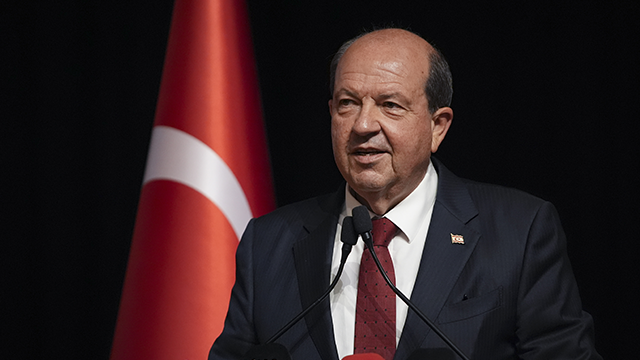
President of the TRNC Tatar: "Turkic states should be more cautious in their relations with the Greek side."
President of the TRNC Tatar: "Turkic states should be more cautious in their relations with the Greek side."
The President of the Turkish Republic of Northern Cyprus (TRNC), Ersin Tatar, commented on the agreement between Kazakhstan, Uzbekistan, Kyrgyzstan, and Turkmenistan, members of the Turkic States Organization (TSO), and the European Union (EU), stating, "Turkic states should be more cautious in their relations with the Greek side."
President Tatar hosted Davut Günaydın, the Vice President of the Turkish Travel Agencies Association (TÜRSAB), and his accompanying delegation at the Presidential Office. During the meeting, Tatar made statements to journalists from Turkey, explaining that the agreement made by some TSO member states with the EU was normal. He said, "It is normal because these countries have entered into such a process in the context of their relations with the EU. After all, these countries have various projects with the EU, and they have interests and benefits both in terms of the private sector and the state. As stated, there are material projects, material contributions, and also various commercial opportunities that the EU can offer them."
Tatar emphasized that the TRNC holds affection and respect for all TSO member states and expressed that it would be more natural for his country to be part of a union of countries that speak the same language and share the same culture.
"The EU's goal in making this agreement is to block the TRNC"
Tatar, who stated that relations between Kazakhstan, Uzbekistan, Kyrgyzstan, Turkmenistan, and other member states of the TSO and the TRNC have been developing, noted that the EU, which had never previously engaged in such relations in that region, aims to block the TRNC, which has been an observer member of the organization since 2022.
President Tatar elaborated on the Turkish stance regarding Cyprus, which calls for a two-state solution, and expressed that he expects Turkic states to establish as much of a relationship with the TRNC as they have with the Greek side.
Tatar also pointed out that there are references to UN resolutions in the article regarding the Cyprus issue in the recent agreement signed between Kazakhstan, Uzbekistan, Kyrgyzstan, Turkmenistan, and the EU. He raised concerns that these clauses may have been overlooked by the Turkic states and questioned, "Do they know where these clauses will lead and what results they will have for whom?"
Wishing that the EU agreement brings good fortune to the Turkic states, President Tatar added:
"Turkic states should be more cautious in their relations with the Greek side. They may have relations with the EU, but the EU is not under the sovereignty of the Greek Cypriots, who number only 800,000. The Turkic states may establish relations with the Greek side, but they must be careful because the game the Greek Cypriots are playing is entirely different. The game the Greeks are playing is beyond humanity. Until the rights and law of the Turkish Cypriot people are recognized by the Turkic states, they should tell the Greeks, 'Wait.' I believe the approach should be, 'We will talk again after an agreement is reached.'"